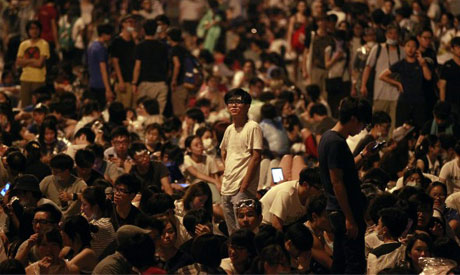
Thousands of protesting students occupy streets around government headquarters in Hong Kong, China, Sunday, Sept. 28, 2014 (Photo: AP)
Hong Kong pro-democracy group Occupy Central on Sunday launched a mass civil disobedience campaign for greater political freedoms from China, as defiant protesters stood their ground outside the city's government headquarters.
The youthful crowd had swelled on Saturday night to more than 10,000 people protesting against the Chinese government's refusal to grant full democracy to the semi-autonomous city, as a tense week of student-led demonstrations came to a climax.
There were scuffles with police overnight as lines of officers pushed back surging crowds with riot shields. Many protesters wore goggles and wrapped their faces in plastic film in case police used pepper spray, in a repeat of angry scenes earlier in the week.
Police made 74 arrests, urging those gathered in the "unlawful assembly" late Saturday to leave the area as soon as possible.
By Sunday the crowds had thinned to around 1,500 -- many of the students having camped out for a second night running -- as exhausted protesters returned home to sleep and shower, vowing to return later.
But the mellow mood of the morning -- with some protesters curled up asleep on the floor -- gave way to fresh frustration as police blocked hundreds of people from entering the protest zone.
Pro-democracy lawmaker Claudia Mo said five people had been arrested, including three fellow legislators, for trying to bring in large loudspeakers they had been hoping to rig up onstage.
"We Hong Kong people are all ready to get arrested to increase the pressure on the government, to gain more bargaining power for the real democratic system," 20-year-old engineering student Peter Chan told AFP as he sat under the scorching sun, facing a line of police officers.
Hong Kong's pro-democracy movement was stunned last month when Chinese authorities refused to grant the former British colony full democracy.
While Beijing would allow elections for the city's next leader in 2017, it will insist on vetting the candidates.
Students went on strike Monday at the start of an angry week of action that has breathed new momentum into the campaign, mobbing the city's leader and briefly storming the government complex on Friday.
Prominent pro-democracy group Occupy Central had for months been planning to bring the city's financial district to a standstill with a massive sit-in, generating huge debate in the city of seven million.
But the group on Sunday admitted that the young activists -- some of them mere high school students -- had stolen the show by drawing large numbers.
Occupy co-founder Benny Tai said the rally would now merge with the student-led protests outside government headquarters, bringing forward the official launch of the Occupy campaign to Sunday from the original start date of October 1.
"Occupy Central starts now," Tai told the crowds.
The group added in a statement: "The courage of the students and members of the public in their spontaneous decision to stay has touched many Hong Kong people. Yet, the government has remained unmoved. As the wheel of time has reached this point, we have decided to arise and act."
In signs that the protesters are digging in for the long-haul, first-aid stations and recycling points have been set up at the site, with water, snacks and materials offering protection from pepper spray freely passed out.
Veteran democracy campaigner Martin Lee said older activists were impressed by how students had seized the initiative.
"We should all aim at the ultimate objective, which is to try to get democracy to our community, for our next generations," he told AFP. "Young people are prepared to do that -- I think we grown-ups ought to participate too."
Political analyst Sonny Lo said the protests marked a turning point in the city's long campaign for democracy.
"From now on there will be more confrontation, possibly violent ones between citizens and police," he told AFP.
But he added that with Beijing maintaining a hardline stance, it was difficult to see a way out of the standoff.
"The government needs to handle the students very carefully -- any mishandling will spark larger acts of civil disobedience," he said.
Former colonial power Britain handed Hong Kong back to China in 1997 under a "one country, two systems" deal that guarantees liberties not seen on the mainland, including freedom of speech and the right to protest.
But tensions have been growing in the southern Chinese city over fears that these freedoms are being eroded, as well as perceived political interference from Beijing.
Short link: